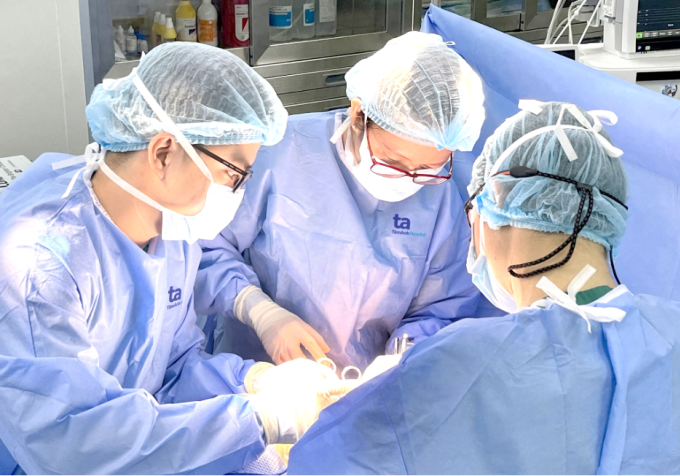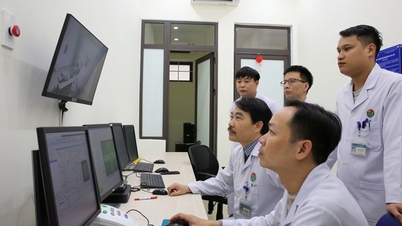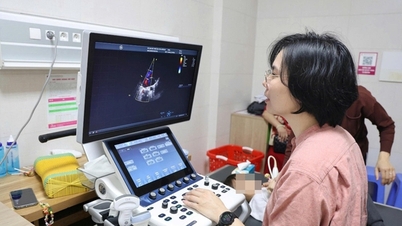Ho Chi Minh City Anh Tri, 32 years old, had a general health checkup and discovered that his thyroid cancer had metastasized, with lymph nodes growing in clusters along both sides of his neck.
On February 6, MSc. Dr. Le Thi Ngoc Hang, Department of Cardiovascular and Thoracic Surgery, Tam Anh General Hospital, Ho Chi Minh City, said that Mr. Tri had no unusual symptoms, his face and neck were not swollen, and he could still eat, drink, and talk normally.
The results of the thyroid ultrasound during the general health check-up showed a multinodular goiter in both lobes, with metastasis to the lymph nodes on both sides. According to Dr. Hang, this is advanced thyroid cancer, with metastasis to the lymph nodes on both sides of the neck but no symptoms. If treatment is delayed, the malignant cells will metastasize to other organs in the body, causing pain, difficulty breathing, difficulty swallowing, persistent cough, and bone pain due to metastasis.
The patient underwent surgery to remove the goiter and dissect the neck lymph nodes. The surgery was difficult because the goiter was hard and firmly attached to the jugular artery and vein (blood vessels that carry blood to the brain), the recurrent laryngeal nerve (the speech nerve), and the thoracic duct (the body's largest lymphatic vessel, responsible for transporting fat from the intestines). The doctor carefully dissected the tumor, avoiding damage to these organs.
After three hours, the surgical team completely removed two thyroid tumors measuring 3x4 cm each, and also dredged 30 neck lymph nodes, the largest of which was 1.5 cm, and 6 of which had metastasized. The nerves and blood vessels were preserved.
The patient recovered quickly, without complications such as hoarseness or numbness in the limbs, and was discharged after two days and continued radioactive iodine treatment to prevent cancer recurrence.

Doctor Hang (center) and the surgical team performed surgery on Mr. Tri. Photo: Tam Anh Hospital
Dr. Le Chi Hieu, Department of Cardiovascular and Thoracic Surgery, Cardiovascular Center, said that early stage thyroid cancer often has no symptoms, only discovered by chance during ultrasound health check or other medical examination. Large tumors cause symptoms of difficulty breathing, difficulty swallowing, pain when swallowing, hoarseness or voice changes, weight loss, fatigue.
Detecting the disease at an early stage helps doctors proactively choose the optimal treatment method, giving patients a high life expectancy and reducing the rate of recurrence. Patients with papillary thyroid cancer at an early stage and treated effectively have a 5-year survival rate of 99.5%, according to Dr. Hieu.
To prevent thyroid cancer, it is necessary to maintain a diet rich in green vegetables, fresh fruits, whole grains, fiber, and adequate iodine in the diet. Limit canned foods, bad fats, do not abuse alcohol, avoid tobacco. Increase physical activity and sports to ensure good health.
Dr. Hai recommends that people with family members with thyroid cancer, especially medullary thyroid carcinoma, should have genetic counseling and regular health check-ups.
Thu Ha
* Patient's name has been changed
| Readers ask questions about cancer here for doctors to answer |
Source link



















































































































Comment (0)